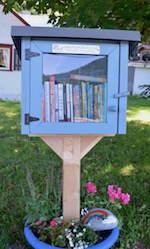Small towns need books (all towns need books)
Skykomish's Little Free Library was launched by Savannah Slone and her girlfriend to give the small town's readers better access to books that touch on poverty and LGBTQIA+ issues (among others). Books available — as of publication — in the exceptionally well-curated library include Roxane Gay's Hunger, Amanda Lovelace's The Princess Saves Herself in This One, Ariel Gore's We Were Witches, and Jeannette Wall's The Glass Castle.

In my rural Washington community, I'm the new owner of a Little Free Library, which my family and I named "Bookworm Exchange." Visitors can take a book, leave a book, or both. My girlfriend and I received a grant to bring our new library to Skykomish with the intention of increasing access to books for our impoverished community. We both have lived in poverty and exist within the LGBTQIA+ community, and books are vital to our feeling heard, included, and worthy. We understand the importance of having free books available, especially for people who don't feel accepted or represented.
It’s safe to say most people are shocked at just how small Skykomish is: a population of just 216. When I graduated from Skykomish High School in 2013, I was the only person in my class. Even though Skykomish School District serves not just Skykomish, but the surrounding communities of Timberlane, Mill Town, Grotto, Baring, and Index, there are currently only 43 students in the entire school district. Preschool through twelfth grade are educated in a single building.
I grew up and still reside in Skykomish, where 96% of the population is white and 19% of the residents live below the poverty level. Eighty-two percent of Skykomish School District students are on a free or reduced-price meal plan. I was raised in one of these low-income households, and I know what a difference having access to books can make: without books, I'd have grown up only knowing the life stories of my peers, people with backgrounds very similar to my own. It would have been years before I interacted with and learned to value people outside of my community. This happens often in our town; small schools come with many benefits, but they also come with geographic isolation, small class sizes, and limited class offerings and extracurricular activities.
As a member of the LGBTQIA+ community, I also know how uplifting it is to feel represented in the books you read. When young readers get their hands on stories they can relate to, they feel less alone. Having the opportunity to read outside of what they know increases empathy and understanding of ethnicities, gender identities, sexual orientations, abilities, and other life experiences that might be different than their own.
If I hadn’t had books with characters that I could relate to, growing up in a small town with few if any others who identified as I did would have been even tougher than it was. Simply living in an isolated area feels secluded and lonely. When you're struggling to pay bills or are a part of a marginalized group, there is an even greater sense of isolation that feeling heard can mend, at least to a degree. Reading about queer people, as well as about people living without much money, made me feel like I wasn’t alone.
Because Skykomish is so remote, our local King County Library System location can't be open as often as libraries. With such low circulation, there isn’t enough need. It's also difficult to find qualified staff willing to work more than three days a week in as rural an area as Skykomish. But the beauty of libraries is that everything is available for free, and that matters even more in small towns with limited resources. I've considered my local library a home away from home for as long as I can remember. I wouldn’t have been able to afford the books I’ve been fortunate enough to have access to without the Skykomish library. Skykomish doesn’t even have a grocery store — so, while the library is a necessity to our community, it is most certainly a privilege as well.
Thomas Jay, Superintendent of Skykomish School District, says, “The Skykomish community is not as passionate about literacy and reading as one would suspect or hope.” He attributes this to a lack of parental involvement and overall motivation. But maybe it's a question of access, too? By offering a variety of diverse books to anyone, at any hour of the day, we're creating the opportunity for an upturn in the town’s readers.
The Little Free Library is just a starting point. I also plan to hold events and start clubs to continue advocating for our town’s developing readers. My hope is that encouraging reading with our Little Free Library will play some role, no matter how small, in helping the youth of Skykomish feel less detached from the rest of the world. These kids would benefit from having more access to books that expand their worldview — and that represent them.